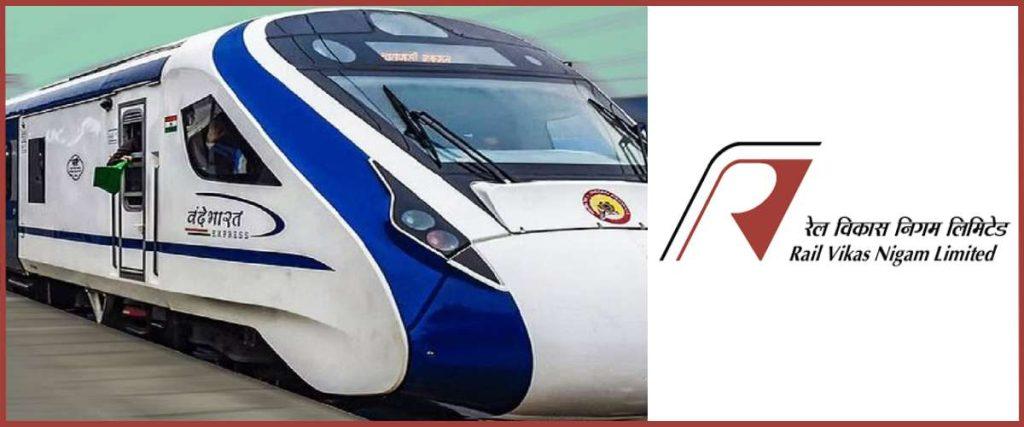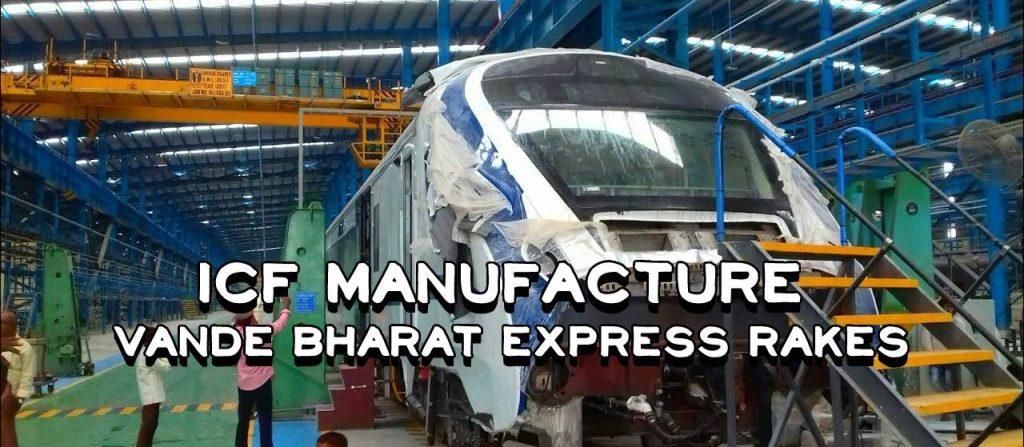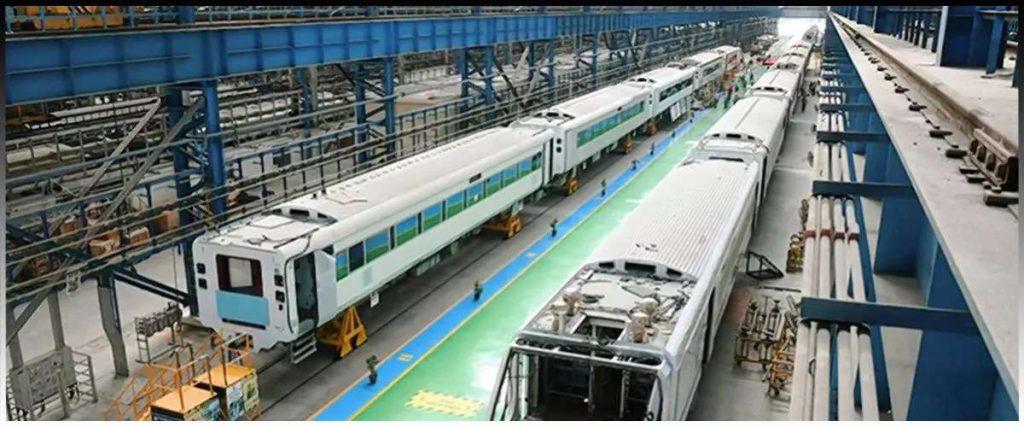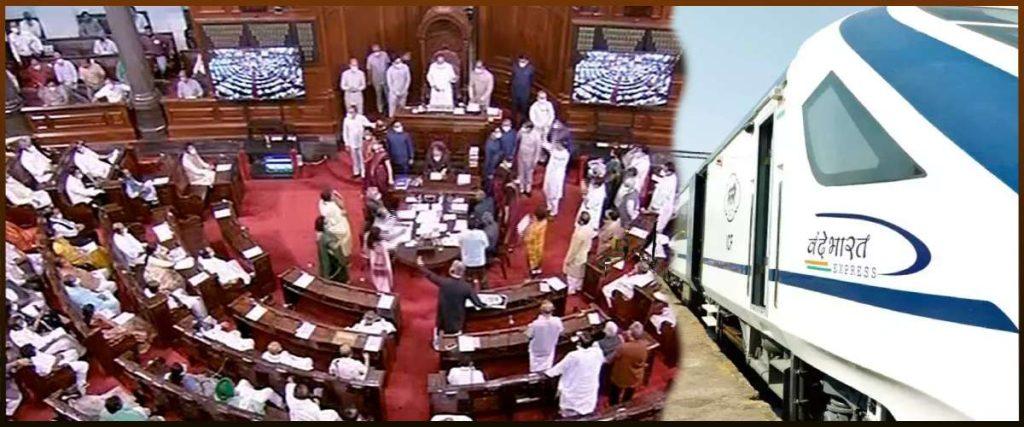Indian Railways’ plan to manufacture 200 new Vande Bharat Express trains has taken a significant step forward, as the lowest bidder have been identified. Russia’s CJSC Transmashholding (TMH) and Rail Vikas Nigam Limited (RVNL) have emerged as the frontrunners for the project, with BHEL and Titagarh Wagons as the second-lowest bidders. This development is crucial for the timely production of the Vande Bharat trains, which are expected to be a game-changer in the country’s railway transportation system.
Table of Contents
TMH-RVNL and BHEL-Titagarh Wagons Compete for 200 New Vande Bharat Express Trains Project
This article discusses the recent development in the tender for manufacturing and maintenance of 200 new Vande Bharat Express trains in India. The consortium of Russia’s CJSC Transmashholding (TMH) and Rail Vikas Nigam Limited (RVNL) has emerged as the lowest bidder for the project, while the consortium of Bharat Heavy Electricals Ltd (BHEL) and Titagarh Wagons came in as the second lowest bidder.
However, concerns have been raised about the ability of these companies to deliver the project on time has been questioned, as they have a relatively low manufacturing presence in India compared to other players. The article provides details about the bid process, the specifications of the Vande Bharat trains, and the government’s plans to manufacture 400 of these trains by the end of 2024-25.
Consortium Bidding War: Competing Offers for Indian Railways’ Ambitious Projects
- The consortium of Russia’s CJSC Transmashholding (TMH) and Rail Vikas Nigam Limited (RVNL) emerges as the lowest bidder for the Rs 58,000-crore tender for manufacturing and maintenance of 200 new Vande Bharat Express trains with a bid of Rs 120 crore per train.
- The consortium of state-run Bharat Heavy Electricals Ltd (BHEL) and Titagarh Wagons emerges as the second lowest bidder with a bid of Rs 139.8 crore per train.
- Several companies participated in the bidding process for the Vande Bharat train tender, including Alstom, a prominent French railway company, the Medha-Stadler consortium consisting of Swiss railway rolling stock manufacturer Stadler Rail and Media Servo Drives based in Hyderabad, and Siemens in partnership with BEML.
Challenges and Concerns Arise Over Timely Production of 200 New Vande Bharat Express Trains
Low manufacturing presence in India
Compared to the other players, RVNL-TMH and the BHEL-Titagarh consortiums have a relatively smaller manufacturing presence in India.
Sudhanshu Mani’s view on the aggressive bidding
According to Sudhanshu Mani, the former general manager of Integral Coach Factory in Chennai and the mastermind behind India’s first Vande Bharat project, the bid results from Russia’s Transmashholding (TMH-RVNL) as the lowest bidder and the BHEL and Titagarh Wagons consortium as the second lowest bidder pose a significant challenge for the timely production of the Vande Bharat trains. The rates offered seemed highly competitive and may have been a result of TMH’s eagerness to secure a foothold in the Indian market through the 120 train order at Latur.
Uncertainty for the ambitious project
Competent manufacturers like Alstom, Siemens, and Stadler were likely to be affected by the aggressive bidding, which could lead to uncertainty for the ambitious project.
Concerns on delivery time
Transmashholding, a Russian company, has no previous manufacturing presence in India, making timely delivery of the 120 Vande Bharat trains a challenging task for them. Additionally, it remains to be seen whether the BHEL-Titagarh consortium will accept the L1 price for the 80 trains to be manufactured at ICF.
Tender Details and Payment Structure for 200 New Vande Bharat Express Trains Project
- The tender was opened on opened on December 1, 2022, with five entities competing for the contract to manufacture and maintain 200 new Vande Bharat Express trains for the next 35 years.
- The winning bidder will receive an upfront payment of Rs 26,000 crore on the delivery of the trains and Rs 32,000 crore over the 35-year maintenance period.
- Under the bid conditions, the lowest bidder (L1) will be awarded the contract to manufacture, supply, and maintain 120 trains at the Latur facility of the Indian Railways. The remaining 80 trains will be manufactured at Chennai and awarded to the second lowest (L2) bidder, provided the price offered by the L1 was matched.
- The lowest bidder (L1) is expected to supply the first prototype train within two years.
- If the L2 bidder refuses to take up the contract, the same offer will be extended to the third lowest bidder. The contract for the remaining trains will be awarded to the L1 bidder if the other bidders don’t match the lowest price offered.
Vande Bharat Express Expansion: Push to Modernize Indian Railways
- The Indian government has announced an ambitious plan to manufacture 400 Vande Bharat trains by 2024-25. This is part of its larger goal of developing the country’s railway infrastructure and boosting local manufacturing under the “Make in India” initiative.
- The Vande Bharat train, also known as Train 18, was designed and developed by the Integral Coach Factory (ICF) in Chennai. It was launched in February 2019 and is India’s first semi-high speed train. The train is capable of running at a speed of up to 180 km/hr and has several modern features such as automatic doors, GPS-based passenger information systems, and onboard Wi-Fi.
- The Indian government has also announced plans to export Vande Bharat trains to South Africa and some European countries. This move is expected to boost India’s standing as a manufacturer of high-quality railway equipment and create new business opportunities for Indian companies. The government has already received inquiries from several countries about the Vande Bharat train, and is actively pursuing opportunities to export the technology.
For more information on the 200 new Vande Bharat Express Trains and the bidding process by TMH-RVNL and BHEL-Titagarh Wagons, please visit Moneycontrol website.
Final Thoughts
- In conclusion, the RVNL-CJSC Transmashholding consortium winning the bid for the 200 new Vande Bharat Express trains tender is a significant development in India’s efforts to boost its domestic manufacturing capabilities and improve its transportation infrastructure. The timely production of these trains will provide a much-needed boost to India’s railway network, and the government’s push towards “Make in India” will be further reinforced.
- The significance of this development lies in the fact that the RVNL-CJSC Transmashholding consortium has a proven track record of delivering high-quality trains, and their expertise in manufacturing rolling stock is expected to ensure timely delivery of the Vande Bharat trains. The consortium’s plans to set up a manufacturing unit in India will also create job opportunities and boost the local economy.
Furthermore, the plan to export Vande Bharat trains to South Africa and some European countries indicates India’s growing ambitions to become a major player in the global railway industry. Overall, the RVNL-CJSC Transmashholding consortium’s win is a step towards India’s goal of modernizing its transportation infrastructure and achieving self-sufficiency in the manufacturing of critical components for the railway sector.
200 New Vande Bharat Express Trains: Frequently Asked Questions
What is the Vande Bharat train project?
The Vande Bharat train project is an Indian government initiative aimed at developing the country’s railway infrastructure and boosting local manufacturing under the “Make in India” initiative. The project aims to manufacture 400 Vande Bharat trains by 2024-25.
Who are the lowest bidders for the 200 new Vande Bharat Express trains project?
CJSC Transmashholding (TMH) and Rail Vikas Nigam Limited (RVNL) are the lowest bidders for the 200 new Vande Bharat Express trains project.
Who are the second-lowest bidders for the 200 new Vande Bharat Express trains project?
The consortium of Bharat Heavy Electricals Ltd (BHEL) and Titagarh Wagons are the second-lowest bidders for the 200 new Vande Bharat Express trains project.
How much did the lowest bidder bid for the 200 new Vande Bharat Express trains project?
The lowest bidder for the 200 new Vande Bharat Express trains project, which is the consortium of Russia’s CJSC Transmashholding (TMH) and Rail Vikas Nigam Limited (RVNL), bid Rs 120 crore per train.
How much did the second-lowest bidder bid for the 200 new Vande Bharat Express trains project?
The second-lowest bidder for the 200 new Vande Bharat Express trains project is the consortium of Bharat Heavy Electricals Ltd (BHEL) and Titagarh Wagons Ltd, with a bid of Rs. 139.8 crore per train.
What is the payment structure for the 200 new Vande Bharat Express trains tender?
The winning bidder for the 200 new Vande Bharat Express trains project will receive an upfront payment of Rs 26,000 crore on delivery of the trains and an additional Rs 32,000 crore over the 35-year maintenance period. The lowest bidder, which is currently the consortium of CJSC Transmashholding (TMH) and Rail Vikas Nigam Limited (RVNL), will be awarded the contract to manufacture, supply, and maintain 120 trains at the Latur facility. The remaining 80 trains will be manufactured at Chennai and awarded to the second lowest bidder, provided their price matches that of the lowest bidder.
Which companies participated in the bidding process for 200 new Vande Bharat Express trains tender?
Several companies participated in the bidding process for the 200 new Vande Bharat Express trains tender, including Alstom, the Medha-Stadler consortium consisting of Swiss railway rolling stock manufacturer Stadler Rail and Media Servo Drives based in Hyderabad, Siemens in partnership with BEML, the consortium of Russia’s CJSC Transmashholding (TMH) and Rail Vikas Nigam Limited (RVNL), and the consortium of state-run Bharat Heavy Electricals Ltd (BHEL) and Titagarh Wagons.
What is the Indian government’s plan for Vande Bharat trains?
The Indian government plans to manufacture 400 Vande Bharat trains by 2024-25 as part of its larger goal of developing the country’s railway infrastructure and boosting local manufacturing under the “Make in India” initiative.
What is the timeline for the delivery of the first Vande Bharat train?
The delivery timeline for the first 200 New Vande Bharat Express trains has not been officially announced. Nevertheless, it is anticipated that the delivery will happen in the coming years, with the initial train expected to be delivered by 2024-25. The lowest bidder (L1) is expected to deliver the first prototype train within two years.




